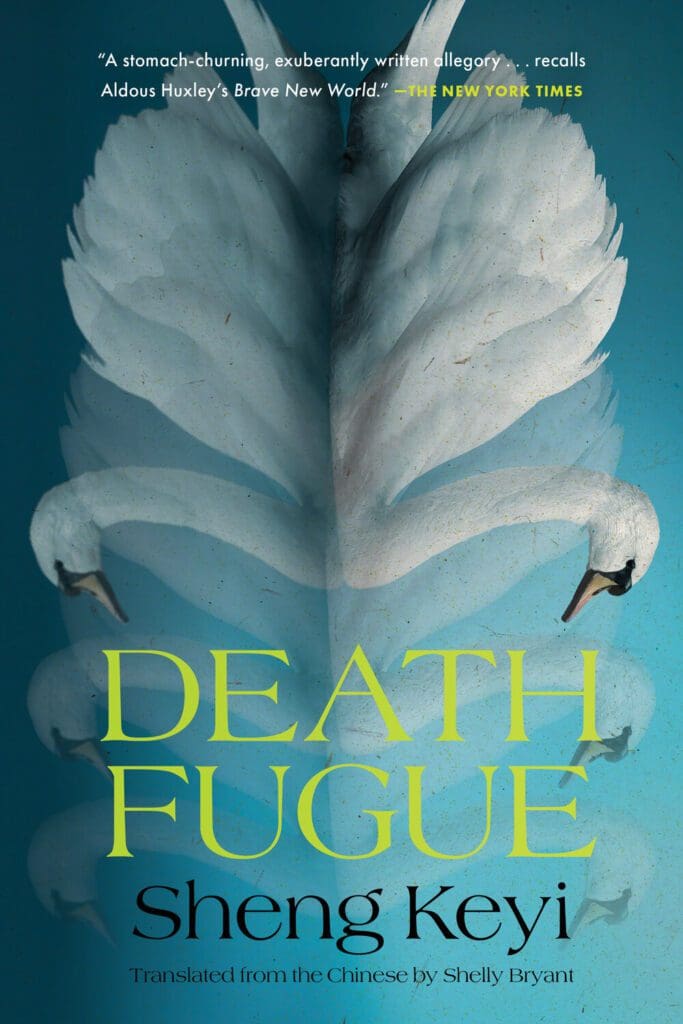In Sheng Keyi’s absurdist novel, Death Fugue (translated by Shelly Bryant; 376 pages; Restless Books), a tower made of feces appears in Round Square in the fictional capital of Beiping, much to the intrigue of young people who do not believe, as the government and media say, that the nine-story heap is composed of gorilla excrement. Concerned with more than sphincter logistics and scatological expertise, this excitable group demands answers from an unaccountable government. In response, protesters are rounded up, thinkers put on watchlists, and the movement’s final gathering quashed with incredible force.
Banned in China’s bookstores and circulating in its literary underground, Death Fugue is worth reading for its unconventional portrayal of post-Tiananmen-Square China alone. When the first dozen pages suggest that the contemporary Chinese state infantilized institutions of learning, commodified faith, bestialized the public, shamed the happy, weaponized sexual promiscuity, and mechanized the human spirit—all of this following an event whose mere mention is illegal—the book feels disruptive indeed.
However, the book is more than an extended fecal allegory. After the Tower Incident, Mengliu, a former poet who took no part in his friends’ uprising, arrives in Swan Valley, a fantastical village of child prodigies and ascetic philosophers disdainful of vice and deferent to a totalizing government that employs infanticide and geronticide. There, Mengliu occupies himself with forbidden seduction games and declines again and again to write poetry, rejecting the village’s increasingly bizarre incentives to do so. Out of shame for abandoning the revolution, he will not write—not for power, not for prestige. Nor will he do it to circumvent anti-sex laws, to save his arranged marriage, to be called a coward less often, to regain access to basic hygiene, to avoid torture or even to see again his soulmate whom he lost years ago after the suppression of Round Square. Though he tries to dodge the topic, he finds himself in the center of many discussions in Swan Valley on the role of the artist under oppressive regimes. But soon, from this quiet utopian village, a disease emerges that requires ventilators and two-week quarantines, an outbreak followed by a mysterious government cover-up.
Death Fugue considers communism and capitalism, courage and the spirit. It is the story of one person determining how they might create a better world, of a society debating the right path forward. On the surface, Death Fugue is also a compilation of literal love stories, or perhaps lust stories, from the peculiarly dispositioned Mengliu. Keyi seems to enjoy writing from Mengliu’s salacious eyes, eyes that prefer to consider how a woman’s posture creates her cleavage more so than the implications of a forced miscarriage or self-immolation. Fun for the attentive reader is the special power deferred to the female characters by Mengliu’s cluelessness: though Mengliu may focus on a woman’s readiness “to get cozy with a man, as if sex were her only joy in life,” we feel the impact of a suggestion that the same woman “stared at the bleeding world without flinching.”
Similar enigmatic images paper the novel—looks “as mysterious as God’s would have been when creating humankind” and women who may “become a human quiver, carrying arrows in the various holes on her body.” Educated characters speak in poetics, likening their plight to a butterfly’s or their appendages to a “sinuous dragon.” Dream sequences appear without warning to dislocate the novel’s already transitory reality. Doctors “sew… their patients’ anuses shut.”
Beyond “pile of dung” being an idiom that holds up in translation, Death Fugue will be all too relatable to a Western reader. Entreaties for resistance while memories of injustice remain fresh are hardly unknown here. And when Beiping’s media leans on their favorite, counter-public-opinion experts to favor the police, when unmarked vans round up peaceful protesters, or when urban and rural citizens split over the value of revolt, Keyi’s world doesn’t seem distant.

